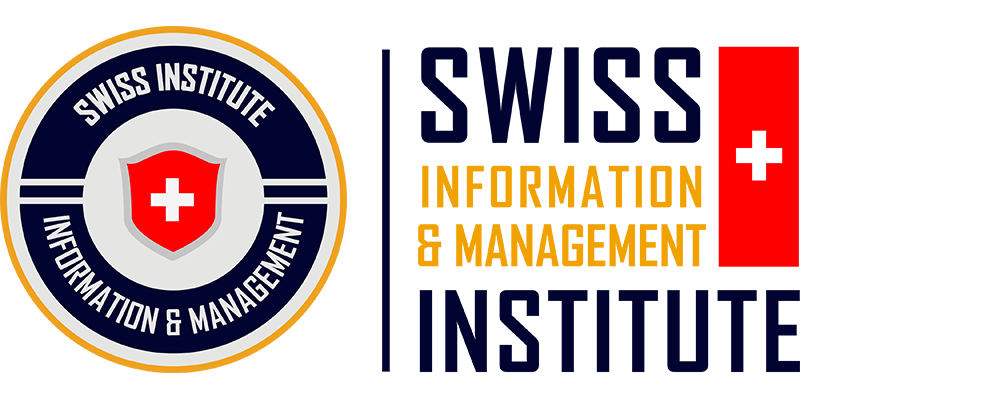



General information
How many levels of diploma programs?
In Switzerland, diploma programs are structured into 8 levels, each corresponding to the 8 levels of the European Qualification Framework (EQF), with level 8 being equivalent to a doctorate level.
Difference between a diploma and degree programs?
- Diploma programs of SIMI Swiss are professional education programs that tend to be shorter, more specialized, and may focus on practical skills or specific job-based training.
- Degree programs of SIMI Swiss are academic education programs that are generally longer and provide a broader and more theoretical education.
How many kinds of qualifications are there?
The type of qualification awarded by a Swiss diploma is based on the size and level of the program.
Level:
This implies that every qualification issued upon completing Swiss Diploma programs is assigned a specific level, ranging from Level 1 to Level 8. The level assigned to a qualification indicates its complexity and rigor. These levels allow for easy comparison and measurement against other qualifications—for instance, a Level 7 award is roughly equivalent to a master's level.
Size:
Thus, while the level system indicates the difficulty, qualifications are categorized by size into Awards, Certificates, and Diplomas. Each category reflects the time required to complete the qualification, with an Award requiring the least time and a Diploma the most.
- an Award is 1 - 12 credits which means 10 - 120 hours of study e.g. the Level 3 Award in Education and Training is 10 credits (100 hours)
- a Certificate is 13 - 36 credits which means 130 - 360 hours of study e.g. the Level 4 Certificate in Education and Training is 30 credits (300 hours)
- a Diploma is 37 or more credits which means 370 or more hours of study e.g. the Level 5 Diploma in Education and Training is 120 credits (1200 hours).
Swiss Diploma Level 3 Competency
| Knowledge | Skills | Responsibility |
|---|---|---|
| Knowledge of facts, principles, processes and general concepts, in a field of work or study | A range of cognitive and practical skills required to accomplish tasks and solve problems by selecting and applying basic methods, tools, materials and information | Take responsibility for completion of tasks in work or study; adapt own behaviour to circumstances in solving problems |
Swiss Diploma Level 4 Competency
| Knowledge | Skills | Responsibility |
|---|---|---|
| Factual and theoretical knowledge in broad contexts within a field of work or study | A range of cognitive and practical skills required to generate solutions to specific problems in a field of work or study | Exercise self-management within the guidelines of work or study contexts that are usually predictable, but are subject to change; supervise the routine work of others, taking some responsibility for the evaluation and improvement of work or study activities |
Swiss Diploma Level 5 Competency
| Knowledge | Skills | Responsibility |
|---|---|---|
| Comprehensive, specialised, factual and theoretical knowledge within a field of work or study and an awareness of the boundaries of that knowledge | A comprehensive range of cognitive and practical skills required to develop creative solutions to abstract problems | Exercise management and supervision in contexts of work or study activities where there is unpredictable change; review and develop performance of self and others |
Swiss Diploma Level 6 Competency
| Knowledge | Skills | Responsibility |
|---|---|---|
| Advanced knowledge of a field of work or study, involving a critical understanding of theories and principles | Advanced skills, demonstrating mastery and innovation, required to solve complex and unpredictable problems in a specialised field of work or study | Manage complex technical or professional activities or projects, taking responsibility for decision-making in unpredictable work or study contexts; take responsibility for managing professional development of individuals and groups |
Swiss Diploma Level 7 Competency
| Knowledge | Skills | Responsibility |
|---|---|---|
| Highly specialised knowledge, some of which is at the forefront of knowledge in a field of work or study, as the basis for original thinking and/or research Critical awareness of knowledge issues in a field and at the interface between different fields | Specialised problem-solving skills required in research and/or innovation in order to develop new knowledge and procedures and to integrate knowledge from different fields | Manage and transform work or study contexts that are complex, unpredictable and require new strategic approaches; take responsibility for contributing to professional knowledge and practice and/or for reviewing the strategic performance of teams |
Swiss Diploma Level 8 Competency
| Knowledge | Skills | Responsibility |
|---|---|---|
| Knowledge at the most advanced frontier of a field of work or study and at the interface between fields | The most advanced and specialised skills and techniques, including synthesis and evaluation, required to solve critical problems in research and/or innovation and to extend and redefine existing knowledge or professional practice | Demonstrate substantial authority, innovation, autonomy, scholarly and professional integrity and sustained commitment to the development of new ideas or processes at the forefront of work or study contexts including research |
Swiss Diploma Level 4 Equivalent
| Level | Regulation framework | Equivalent Degrees |
|---|---|---|
| 4 | Level UK (RQF) | higher apprenticeship higher national certificate (HNC) level 4 diploma level 4 NVQ |
| 7 | Scottish Credit and Qualifications Framework (SCQF) | Advanced Higher Higher National Certificates Certificate of Higher Education Professional Development Awards SVQ 3 |
| Year 1 of a 3-year university | Framework for Higher Education Qualifications (FHEQ) | Confirmation of year 1 in College Certificate of higher education (CertHE) |
| 5 | European Qualifications Framework (EQF) | Level 4 Vocational Qualifications Higher National Certificate (HNC) |
| 5 | Australian Qualifications Framework (AQF) | Diploma |
| 5 | African Continental Qualification Framework (ACQF) | Higher Certificates (Higher Education and Training) |
| 4 | ASEAN Qualifications Reference Framework (AQRF) | Level 4 Vocational Qualifications Higher National Certificate (HNC) |
| 4 | Vietnam Qualification Framework (VQF) | Intermediate degree |
Swiss Diploma Level 5 Equivalent
| Level | Regulation framework | Equivalent Degrees |
|---|---|---|
| 5 | Level UK (RQF) | higher national diploma (HND) level 5 diploma level 5 NVQ |
| 8 | Scottish Credit and Qualifications Framework (SCQF) | Higher National Diplomas Diploma of Higher Education Professional Development Awards SVQ 4 |
| Year 2 of a 3-year university | Framework for Higher Education Qualifications (FHEQ) | Confirmation of year 2 in University diploma of higher education (DipHE) foundation degree |
| 5 | European Qualifications Framework (EQF) | Level 5 Vocational Qualifications Higher National Diplomas (HND) |
| 6 | Australian Qualifications Framework (AQF) | Associate Degree Advance Diploma |
| 6 | African Continental Qualification Framework (ACQF) | (National) Diplomas (Higher Education and Training) |
| 5 | ASEAN Qualifications Reference Framework (AQRF) | Level 5 Vocational Qualifications Higher National Diplomas (HND) |
| 5 | Vietnam Qualification Framework (VQF) | College degree |
Swiss Diploma Level 6 Equivalent
| Level | Regulation framework | Equivalent Degrees |
|---|---|---|
| 6 | Level UK (RQF) | degree apprenticeship graduate certificate graduate diploma level 6 diploma level 6 NVQ ordinary degree without honours |
| 10 | Scottish Credit and Qualifications Framework (SCQF) | Honours Degree Graduate Certificate / Diploma Professional Development Awards SCQF Level 9 Bachelors/Ordinary Degree Graduate Certificate / Diploma Professional Development Awards SVQ 4 |
| Year 3 of a 3-year university | Framework for Higher Education Qualifications (FHEQ) | Degree Degree with honours - for example bachelor of the arts (BA) hons, bachelor of science (BSc) hons |
| 6 | European Qualifications Framework (EQF) | Level 6 Vocational Qualifications Bachelor Degree Bachelor Degree with Hons |
| 7-8 | Australian Qualifications Framework (AQF) | Bachelor Degree (Level 7) Bachelor Degree with Hons (Level 8) |
| 7-8 | African Continental Qualification Framework (ACQF) | Bachelor Degree (Level 7) Bachelor Degree with Hons (Level 8) |
| 6 | ASEAN Qualifications Reference Framework (AQRF) | Level 6 Vocational Qualifications Bachelor Degree Bachelor Degree with Hons |
| 6 | Vietnam Qualification Framework (VQF) | Bachelor degree |
Swiss Diploma Level 7 Equivalent
| Level | Regulation framework | Equivalent Degrees |
|---|---|---|
| 7 | Level UK (RQF) | level 7 diploma level 7 NVQ postgraduate diploma |
| 11 | Scottish Credit and Qualifications Framework (SCQF) | Masters Degrees Post Graduate Diploma SVQ 5 |
| Master Degree | Framework for Higher Education Qualifications (FHEQ) | integrated master’s degree, for example master of engineering (MEng) master’s degree, for example master of arts (MA), master of science (MSc) |
| 7 | European Qualifications Framework (EQF) | Masters Degrees Post Graduate Diploma |
| 9 | Australian Qualifications Framework (AQF) | Masters Degrees |
| 9 | African Continental Qualification Framework (ACQF) | Masters Degrees Post Graduate Diploma |
| 7 | ASEAN Qualifications Reference Framework (AQRF) | Masters Degrees Post Graduate Diploma |
Swiss Diploma Level 8 Equivalent
| Level | Regulation framework | Equivalent Degree |
|---|---|---|
| 8 | Level UK (RQF) | level 8 diploma |
| 12 | Scottish Credit and Qualifications Framework (SCQF) | Doctoral Degrees Professional Development Awards |
| Doctor degree | Framework for Higher Education Qualifications (FHEQ) | doctorate, for example doctor of philosophy (PhD or DPhil) |
| 8 | European Qualifications Framework (EQF) | doctorate, for example doctor of philosophy (PhD or DPhil) level 8 diploma |
| 10 | Australian Qualifications Framework (AQF) | Doctoral Degree |
| 10 | African Continental Qualification Framework (ACQF) | Doctoral Degree |
| 8 | ASEAN Qualifications Reference Framework (AQRF) | Doctoral Degree Level 8 Diploma |
Awards of SIMI Swiss
An Award is 1 - 12 credits which means 10 - 120 hours of study.
Example: The Level 4 Award in Education and Training is 12 credits (120 hours)
Certificate of SIMI Swiss
A Certificate is 13 - 36 credits which means 130 - 360 hours of study.
For example: the Level 4 Certificate in Human Resource Management is 36 credits (360 hours)
Diploma of SIMI Swiss
A Diploma is 37 or more credits which means 370 or more hours of study
For example: the Level 7 Diploma in Education and Training is 120 credits (1200 hours).
Combine Level & Size
All qualifications within Swiss Diploma programs combine both Level and Size in the diploma's name.
For example, a qualification named "Level 7 Award in Logistics Management" implies that the program is at Level 7 (equivalent to Master's level) and has a Size below 13 credits, corresponding to a total training duration of under 130 hours.



Bridging the gap between the market and your goals
The Swiss Diploma focuses on practical training through the STEP model.
S - Self Study
T - TUTORS
E - EVIDENCES
P - PROJECT
Choose the perfect program for your needs
The Swiss Diploma provides a wide variety of programs across different levels and specializations, with qualifications recognized in over 180 countries, enabling students to select options that best suit their individual needs, ensuring maximum practicality and effectiveness.



Our mission
The Swiss Diploma ensures students are knowledgeable and proficient in applying their skills to real-world situations, aligning with labor market needs.
Switzerland ranks 1st globally in diploma programs
The Swiss Diploma system combines work-based learning with industry-driven curriculum development, ensuring students apply theoretical knowledge in real-world settings and meet current job market needs.
Its flexibility and ongoing career guidance help students adapt to market changes and effectively navigate their career paths.
Powered by SIMI Swiss

Ask us anything
Welcome to Switzerland's globally accredited professional programs.




